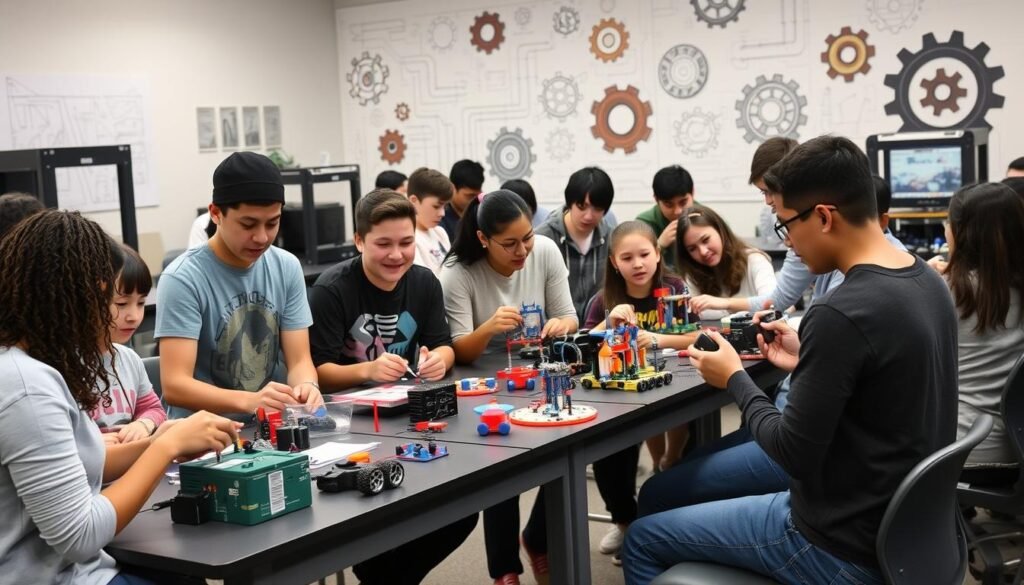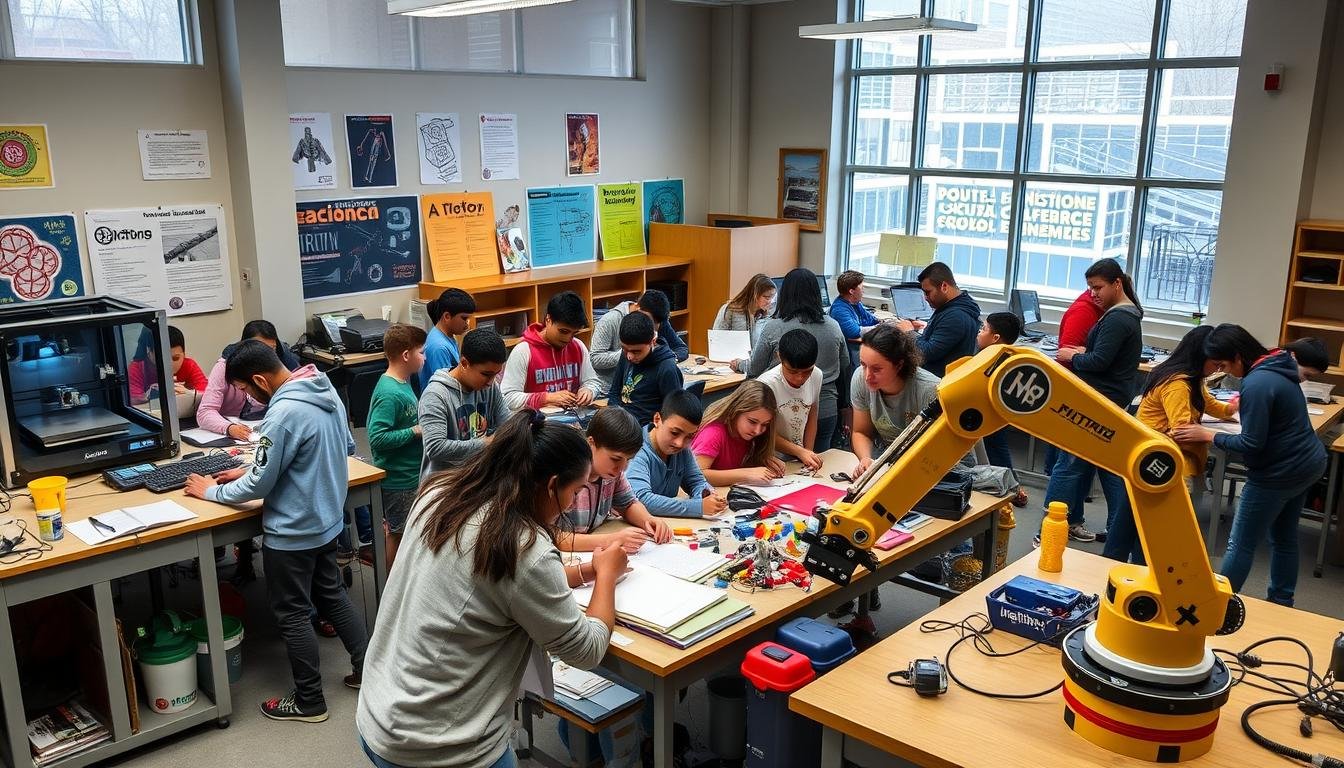Welcome to the exciting world of mechanical engineering education! This field is key for innovation, combining engineering, physics, and materials science. It helps create and analyze mechanical systems. As you learn, you’ll see how education unlocks innovation, shaping your career.
With a background in mechanical engineering, you’ll find many career paths. These include aerospace, automotive, energy, and manufacturing. Knowing these opportunities prepares you for success and sparks your curiosity in this vital field.
Key Takeaways
- Mechanical engineering education is vital for innovation in various industries.
- Specializing in this field opens diverse career paths in mechanical engineering.
- Understanding core principles facilitates innovative thinking and solutions.
- Education plays a key role in shaping future engineers and leaders.
- Mechanical engineering combines multiple scientific disciplines for comprehensive learning.
The Importance of Mechanical Engineering Education
Getting into mechanical engineering education is key for those looking to succeed in this field. It gives you the skills and knowledge to solve complex engineering problems. You’ll learn core engineering concepts, preparing you for today’s tech challenges.
Studying mechanical engineering leads to new technologies and real-world applications. It lets you contribute to many sectors, improving efficiency, safety, and sustainability. The focus on engineering education shows how vital it is to have skilled workers for new tech.
Starting this educational path opens up many career opportunities. The value of mechanical engineering education is huge. It prepares you for future challenges and gives you problem-solving skills for success in a competitive world.

Understanding the Scope of Mechanical Engineering
The field of mechanical engineering is huge, covering areas like thermodynamics, fluid mechanics, materials science, and robotics. As a mechanical engineer, you connect these fields, making it easier for teams to work together and find new solutions.
Today, technology is changing how we work, making sustainability and efficiency key. Engineers are working on projects like renewable energy, advanced manufacturing, and green designs. This work not only improves standards but also changes what it means to be a great engineer today.
Education in mechanical engineering is also changing, getting ready students for big global challenges. Schools now use real-world tech to teach practical skills. This way, students get both the theory and hands-on experience they need to succeed in the job market.

| Sub-Disciplines | Key Focus Areas | Innovative Applications |
|---|---|---|
| Thermodynamics | Energy transfer and conversion | Renewable energy systems |
| Fluid Mechanics | Behavior of fluids in motion | Aerospace engineering |
| Materials Science | Material properties and applications | Smart materials in design |
| Robotics | Automation and control | AI-driven manufacturing |
Knowing the wide range of mechanical engineering opens up chances for new ideas. By embracing these changes, you can make a big impact in both school and your future career.
Education Unlocking Innovation: Exploring Mechanical Engineering and Its Scope
Mechanical engineering education is key to innovation in many fields. Schools now focus on hands-on learning and real-world uses. This helps students develop creativity and problem-solving skills, vital for engineers.
The Role of Innovation in Mechanical Engineering Education
Innovation in mechanical engineering goes beyond just book knowledge. It’s about using the latest technologies and methods in learning. Curriculums keep up with industry trends, making sure students know about new advancements. This keeps the curriculum relevant for today’s industries.
Identifying Key Areas of Study
Mechanical engineering covers many exciting areas. Key focuses include:
- Renewable Energy
- Robotics
- Advanced Manufacturing Technologies
Students dive into these fields to learn about new technologies and practical skills. They work on projects with industry partners, deepening their understanding of innovation in mechanical engineering.

| Area of Study | Description | Key Technologies |
|---|---|---|
| Renewable Energy | Focuses on sustainable energy solutions | Solar panels, wind turbines, bioenergy |
| Robotics | Involves automation and intelligent systems | AI, machine learning, robotic arms |
| Advanced Manufacturing Technologies | Explore innovative manufacturing techniques | Additive manufacturing, CNC machining |
Innovative Technologies in Mechanical Engineering
The world of mechanical engineering is changing fast with new technologies. 3D printing is a big change, making it possible to create complex designs. It also helps make parts lighter and uses less material.
Artificial intelligence is also changing engineering. It uses big data to make designs better and predict when things need fixing. This lets engineers do more important work.
New materials are another big step forward. Things like composites and nanomaterials make products stronger and last longer. They’re used in many fields, showing how engineering can make things better.
Now, engineers are also focusing on being green. They’re working on using less energy and making things that are better for the planet. This includes making machines that use less power and making things in ways that are kinder to the environment.
Keeping up with these new technologies is key to success in engineering. Knowing about these changes helps you tackle today’s challenges and be ready for tomorrow’s.
| Technology | Description | Impact on Engineering |
|---|---|---|
| 3D Printing | Utilizes additive manufacturing techniques to create complex designs. | Reduces waste, allows for lightweight components. |
| Artificial Intelligence | Applies machine learning algorithms for data analysis. | Optimizes designs, predicts maintenance needs. |
| Advanced Materials | Involves composites and nanomaterials for enhanced performance. | Improves durability and functionality in products. |
| Sustainable Technologies | Focuses on renewable energy systems and eco-friendly practices. | Minimizes environmental impact, promotes energy efficiency. |
Mechanical Engineering Curriculum: What to Expect
Understanding the mechanical engineering curriculum is key for those interested in this field. It covers core subjects that give a solid foundation in both theory and practice. Students also get hands-on learning experiences that boost their skills and knowledge.
Core Subjects and Electives
The curriculum includes vital core subjects like:
- Statics: It’s about forces and their effects on still objects.
- Dynamics: Deals with forces and their effects on moving things.
- Fluid Dynamics: Studies how fluids move.
- Thermodynamics: Looks into heat transfer and energy changes.
Students also have the chance to pick from various electives. These can be in aerospace engineering, robotics, or renewable energy. This lets you shape your education to fit your interests and career goals.
Hands-On Learning Opportunities
Hands-on learning is crucial in engineering education. It prepares students for the real world. Practical experiences include:
- Internships: Working in companies to get real-world experience.
- Laboratory Work: Doing experiments to apply theoretical knowledge.
- Design Projects: Working on projects that foster creativity and practical application.
These experiences are key to the curriculum. They help students develop technical skills and problem-solving abilities. These are essential for success in engineering.
Mechanical Engineering Career Opportunities
Mechanical engineering offers a wide range of career paths in different industries. With the need for skilled workers growing, graduates have bright futures ahead. They can find jobs in the automotive, energy, aerospace, and manufacturing sectors. New areas like robotics and renewable energy also need mechanical engineers.
Diverse Fields and Industries
When you look into mechanical engineering careers, you’ll see many industries looking for your skills. Here are some key sectors that need mechanical engineers:
- Automotive Engineering: Deals with designing cars and their parts.
- Aerospace Engineering: Focuses on aircraft and spacecraft development.
- Energy Sector: Works on renewable energy and efficient systems.
- Manufacturing: Focuses on improving production and machinery.
- Robotics: Involves designing smart machines for different uses.
Top Employers in Mechanical Engineering
Many top companies are looking for mechanical engineers. These companies offer great opportunities, making it easier to find a job. Here are some of the leading employers:
| Company Name | Industry | Notable Opportunities |
|---|---|---|
| Boeing | Aerospace | Aircraft design and manufacturing positions |
| Ford | Automotive | Vehicle design, engineering analysis roles |
| Siemens | Energy and Automation | Engineering for renewable energy projects |
| General Electric | Energy | Innovative product development initiatives |
| ABB | Robotics and Automation | Automation solutions engineering roles |
Advancements in Mechanical Engineering
The field of mechanical engineering is always changing. New breakthroughs in smart manufacturing, robotics, and materials are leading the way. These innovations give engineers new ways to work more efficiently and productively.
Looking ahead, it’s key to see how education in mechanical engineering will evolve. Working together, schools and tech companies are driving innovation. This teamwork helps solve real-world problems. Staying up-to-date with new skills is crucial in this fast-paced field.
The table below shows the latest trends in mechanical engineering research. It highlights important areas and their impact on the industry:
| Research Trend | Description | Implications for Industry |
|---|---|---|
| Smart Manufacturing | Integration of AI and IoT for automation and data exchange. | Increased efficiency and reduced operational costs. |
| Advanced Robotics | Development of robots capable of complex tasks. | Enhanced precision in manufacturing processes. |
| Material Innovation | Research into new materials such as composites and smart materials. | Improved product performance and sustainability. |
| Additive Manufacturing | 3D printing technologies for rapid prototyping and customization. | Revolutionized design processes and reduced waste. |
By embracing these new developments in mechanical engineering, you’ll be ready for the future. You’ll make a real difference in your field.
Mechanical Engineering Skills Essential for Success
To succeed in mechanical engineering, you need to master both technical and soft skills. Technical skills help you understand and use complex engineering ideas. Soft skills, on the other hand, improve your teamwork abilities. Finding the right balance between these skills is key to overcoming engineering challenges.
Technical Skills vs. Soft Skills
Technical skills are crucial for mechanical engineers. You need to be good with CAD software, have strong analytical skills, and know how to program. These abilities help you solve complex problems and create new solutions.
But soft skills are just as important. Skills like communication, teamwork, and adaptability are vital for working well with others. A skilled engineer, who excels in both technical and soft skills, can greatly contribute to team success and innovation.
FAQ
What is the importance of mechanical engineering education?
Mechanical engineering education is key. It gives you the skills and knowledge to solve complex engineering problems. It helps you understand important engineering concepts and how to apply them in real-world situations. This is crucial for success in many industries.
What areas can I specialize in within mechanical engineering?
Mechanical engineering has many areas to specialize in. You can focus on thermodynamics, fluid mechanics, robotics, or materials science. You might also choose to specialize in renewable energy, aerospace, or advanced manufacturing, depending on your interests and career goals.
What are the job prospects for mechanical engineers?
Mechanical engineers have great job prospects. They are needed in many fields like automotive, aerospace, energy, and manufacturing. New areas like robotics and sustainable energy also create more job opportunities for skilled engineers.
How does innovation impact mechanical engineering education?
Innovation changes mechanical engineering education a lot. It adds hands-on learning and real-world applications. Schools work with industries on projects to improve their programs. This prepares students for the latest technologies.
What kind of skills are essential for a successful career in mechanical engineering?
To succeed in mechanical engineering, you need technical skills like CAD software and analytical thinking. You also need soft skills like communication, teamwork, and adaptability. Having both is important for working well in different engineering settings.
What innovations are currently shaping the field of mechanical engineering?
New technologies like 3D printing, artificial intelligence, and advanced materials are changing mechanical engineering. They improve design and manufacturing and help make the industry more sustainable and eco-friendly.
What can I expect in a mechanical engineering curriculum?
A mechanical engineering curriculum covers core subjects like statics, dynamics, and fluid dynamics. It also includes electives for specialization. You’ll get practical experience through internships and design projects, which add to your theoretical knowledge.
Who are some top employers in the mechanical engineering field?
Top employers in mechanical engineering include big names like Boeing, Ford, and Siemens. These companies offer jobs in new fields where innovation is key. They need skilled mechanical engineers to drive their progress.




